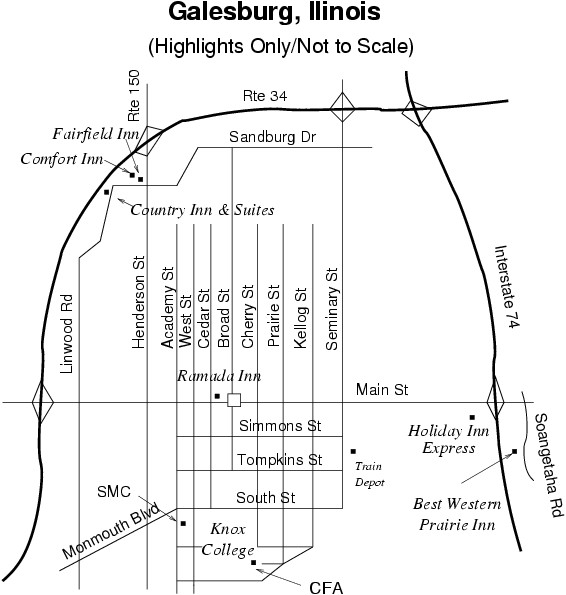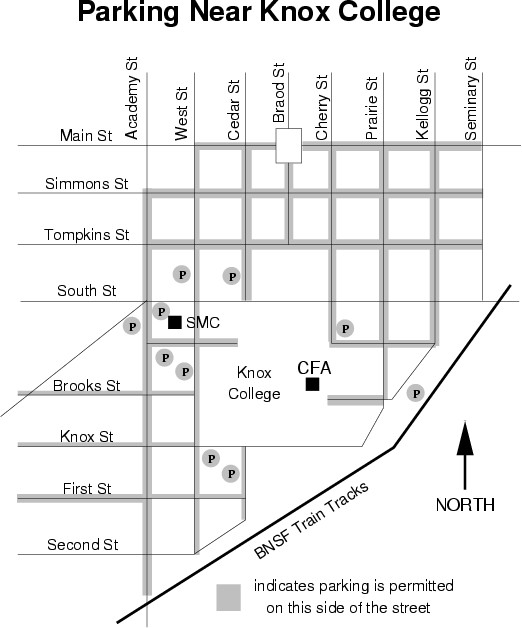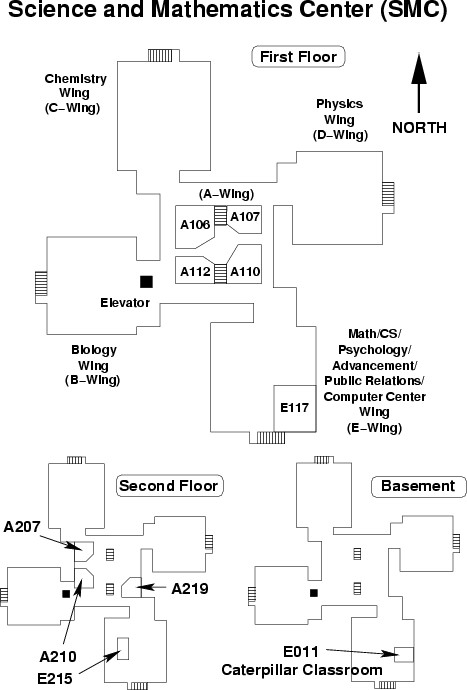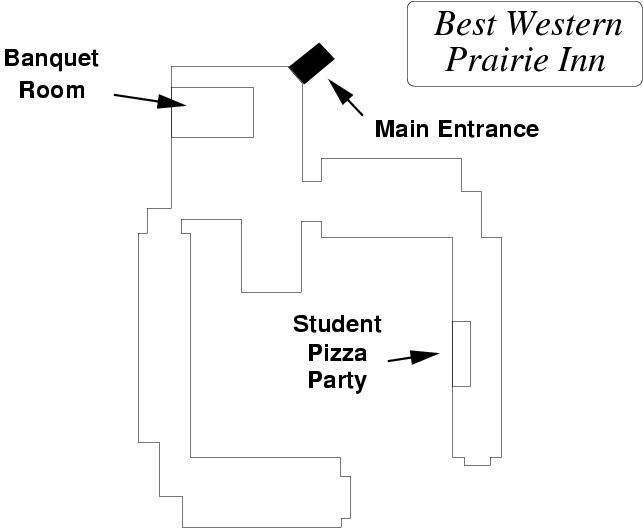
ISMAA 2005:
The 2005 Annual Meeting of the Illinois Section of the Mathematical Association of America

The Eighty Fourth Annual Meeting of the Illinois Section of the Mathematical Association of America will be held April 8 and 9, 2005, at Knox College in Galesburg, Illinois
The meeting includes addresses by Jean Bee Chan of Sonoma State University, Underwood Dudley of Florida State University, Dan Kalman of American University, and Phil Straffin of Beloit College. There will also be a workshop on Discovery-Based Learning headed by Melvyn Jeter of Illinois Wesleyan University. In addition, there will be presentations from ISMAA members from around the state. Undergraduate student activities include a mathematics contest, a pizza party, and contributed paper sessions specifically for undergraduates.
Please contact Andrew Leahy if you have questions about any aspect of the program.
Title: How Should We View an Art Gallery?
Time: Saturday 12:00PM
Place: Science and Math Center A110
Abstract: How many paintings can we view from any one point in
an art gallery? We will first give a brief history and proof of the
Art Gallery Theorem for polygonal galleries. Next, what about
galleries in the shape of arbitrary closed and connected sets in the
plane? Finally, we will view art via arcwise convex arcs in simply
connected and compact galleries. The talk will conclude with some
open problems in this area.
Title: Formulas for primes
Time: Friday 7:30PM
Place: Best Western Prairie Inn
Abstract: Formulas are fascinating and so are primes, so
formulas for primes should be doubly fascinating. This talk surveys
the field and ends with a moral conclusion. Exactly one theorem will
be proved.
Title: The Fibonacci Numbers -- Exposed (Note New Title)
Time: Saturday 8:30AM
Place: Science and Math Center A110
Abstract: Everyone knows about the Fibonacci Numbers. With all
of its amazing and fascinating attributes, it is a sort of
super-sequence. But what if, like superman, it is really just a
rather pedestrian speciman of an entire super-race? Perhaps it
acquires all of its powers from the planet of its birth, and in that
setting would be neither amazing nor unusual. In this case, the home
world is the planet of two-term recurrences, where Fibonacci is just
an ordinary Joe.
Title: Explorations in the Mathematics of Other Cultures
Time: Friday 12:45PM
Place: Center for Fine Arts (CFA) Kresge Auditorium
Abstract: For the past ten years at Beloit we have taught a
course in ethnomathematics, introducing students to mathematical
thinking in non-Western cultures. The course has been extremely
popular among students and great fun for the faculty. I'll describe
the course briefly, and then focus on mathematical explorations which
have grown out of it, involving Tshokwe sona, Malekulan nitus, the
symmetries of bi-strips, and the Ghanian game of Achi.
Time: Friday 9:30AM - 11:30AM
Presenter: Melvyn Jeter (Illinois Wesleyan University)
Place: Science and Math Center SMC A207
Abstract:
It may come as a surprise to many that discovery-based learning,
sometimes referred to as inquiry-based learning, has played a dramatic
role in the development of the American mathematical community. This
workshop will feature some history of the technique, experiences of
those who have successfully used the method, examples of class notes
for discovery-based courses, and will introduce the participants to a
vast collection of support materials.
For a more detailed abstract, click here (PDF).
| 9:30AM - 11:30AM Workshop on Discovery-Based Learning (SMC A207) | |||
| 12:45PM - 1:45PM Plenary Talk by Phil Straffin (CFA Kresge Auditorium) | |||
| 2:00PM - 3:00PM Concurrent sessions | |||
| Session A (SMC A207) (30 minutes each) |
Session B (SMC A210) (30 minutes each) |
Session C (SMC A219) (30 minutes each) |
Session D (SMC A106) |
| Fedor Andreev, Visualizing Mobius transformations and plane tilings | Manmohan Kaur, Some Uses of WebCT in Calculus | Jeff Hildebrand, Fairness in scheduling: Using a Monte Carlo model to simulate a baseball season | Film: Challenge in the Classroom |
| Tony Bedenikovic, Two-complexes with Nontrivial Self-Covers | Dawn Wagner Lindquist, Introducing Math Majors to Journal Article Reading | Leonard Blackburn, Math Contests: Friendly Problem Solving for Everyone | 3:15PM - 4:15PM Concurrent sessions |
| Session A (SMC A207) (30 minutes each) |
Session B (SMC A210) (30 minutes each) |
Session C (SMC A219) (30 minutes each) |
Session D (SMC E011) (30 minutes each) |
| Nader Vakil, Construction of Completions, A New Approach Using Modern Infinitesimals | Steve Hinthorne, Insights into Teaching Future Elementary Teachers | Paul Bialek, Bald answers, table-scrapping and inoculation: Grading the AP Calculus exam | Vali Siadat, Applications of the Axial Representation of Trigonometric Functions |
| Dan Hrozencik, Finding Median Sets of Tree Structures in Synchronous Distributed Systems | CANCELLED | Patricia Kiihne, Mathematics and the Maya | Douglas Lewit, Using Maple to Simulate the Negative Binomial Distribution with Applications to Modeling the Spread of HIV |
| 4:30PM - 6:00PM | |||
| Undergraduate Mathematics Contest (SMC E117) | Annual Business Meeting (SMC A106) | ||
| 6:15PM - 7:30PM | |||
| Undergraduate Pizza Party (Prairie Inn) | Reception and Banquet (Prairie Inn) | ||
| 7:30PM - 8:30PM Plenary Talk by Underwood Dudley (Prairie Inn) | |||
| 8:30AM - 9:30AM Plenary Talk by Dan Kalman (Science and Math Center A110) | |||
| 9:40AM - 10:40AM Concurrent sessions and undergraduate papers | |||
| Session A (SMC A207) |
Session B (SMC A210) (30 minutes each) |
Session C (SMC A219) (30 minutes each) |
Session D (SMC E117) (30 minutes each) |
| Panel Discussion: What's the Interview Process Really Like? An Informational Panel for Graduate Students | David Lukens, From Euclid to Godel by way of Lobachevsky | John Chisholm, Dividing the Goods | Sharon Robbert & Katie DeKoekkoek, A Crash Course for Connecting Curve Cryptology |
| Vince Matsko, A High School Course on Polyhedra | Roger Eggleton, Equal Sums of Squares | Timothy Comar, A Calculus Sequence for Biology Students | |
| 10:50AM - 11:50AM Concurrent sessions and undergraduate papers | |||
| Session A (SMC A207) (30 minutes each) |
Session B (SMC A110) |
Session C (SMC A219) (30 minutes each) |
Session D (SMC A210) (30 minutes each) |
| Ollie Nanyes, Limits of Functions of Two Variables | Underwood Dudley, Why Teach Mathematics? (Sponsored by Project NExT) | Rich Wilders, Galileo's Computation of the Tangent Line to a Parabola | Lisa Townsley, The CLEP Precalculus Exam |
| Mehmet Dik, On Tauberian Conditions of Slowly Oscillating Type | Andrew Leahy, James Gregory's Proof of the FTC | Howard Dwyer, How Could Anyone Discover the Laplace Transform? | |
| 12:00PM - 1:00PM Plenary Talk by Jean Bee Chan (Science and Math Center A110) | |||
An extensive list of places to stay in Galesburg is available from the Knox College Office of Admissions web site (ask for the Knox College rate) or from the Galesburg Convention and Visitors Bureau. A limited number of dorm-room accommodations (with Knox students) may also be available for undergraduate participants. Please contact Andrew Leahy for more information.
Note that the Friday evening banquet and student pizza party will held at the Best Western Prairie Inn on I-74 and East Main Street.




Galesburg is accessible via Interstate 74. Complete directions to Knox can be found on the Knox College Admissions web site, where a map of Galesburg highlighting directions to Knox College may also be found.
On Amtrak, Galesburg is served by the California Zephyr, Illinois Zephyr, and Southwest Chief. The train depot is five blocks from campus. More information is available from the Admission Office web site.